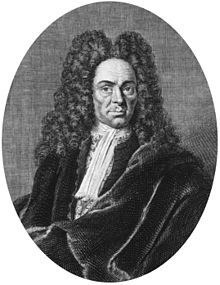Jacob Leupold
German multidisciplinary scientist
Jacob Leupold (1674–1727) was a German physicist, scientist, mathematician, instrument maker, mining commissioner and an engineer. He wrote the important and popular book Theatrum Machinarum Generale, ("The General Theory of Machines") which was published in 1727.

Quotes
edit- Most often it is the case that people know that something big can be manipulated with it [i.e., the screw], but not how and in what way it is connected to time, and that untold time, and finally such force of machines, wheels, and shafts is necessary as cannot be produced nor be had.
- Jacob Leupold (1724); as cited in: Helmut Müller-Sievers (2012) The Cylinder: Kinematics of the Nineteenth Century. p. 146
- I had not only opportunity of seeing how different things have been made, but also manual work made me strong.
- Jacob Leupold, quoted in: Biography of Jacob Leupold (1674–1727) on history-computer.com, 2013
- [His work is addressed]... not to the learned and experienced mathematicians who are already, or should be, better acquainted with them... [and most of whom] have studied mechanics more as a subject of curiosity and a hobby, than with any view of service to the public. The people we had in mind were rather the mechanic, handicraftsman and the like, who, without education or knowledge of foreign languages have no access to many sources of information...
- Jacob Leupold (1724-39) Theatrium machinarum, as quoted in: Biography of Jacob Leupold (1674–1727) on history-computer.com, 2013
Quotes about Jacob Leupold
edit- "Theatrum machiuamm universale," &c. by Jacob Leupold, Leipsic, seven volumes, folio, 1724, 1727,1774. This is the greatest and most complete work of this kind that ever was published. The first volume is little more than an introduction to the work; the second and third volumes contain a description of hydraulic machines; the next two volumes relate to machines for raising weights, the theory of levelling, and other subjects; and the sixth treats principally on machines connected with the construction of bridges; the seventh volume is entitled, "Theatre arithmetico geometrique," where the author treats of all instruments employed in these two sciences This work would have been much more considerable if its author had lived to complete the immense task he had undertaken.
- Peter Barlow (1814) A New Mathematical and Philosophical Dictionary
- In the Histoire de l'Academie for the year 1725, p. 78, it is stated that when M. du Fay was at Strasbourg, M. Jacob Leupold had a pump which threw water in a continuous stream, using only one piston, and that he made a great mystery of it; but that M. du Fay immediately stated the reason of it.
- Charles Frederic T. Young (1866) Fires, fire engines, and fire brigades: with a history of manual and steam fire engines. p. 79
- Jacob Leupold (1674-1727) German engineer who collected, for the first time in print, the basic principles of mechanical engineering.
- Neil Schlager (2000) Science and Its Times: 1700-1799. p. 446
- Leupold is also credited as an early inventor of air pumps. He designed his first pump in 1705, and in 1707 he published a book Antlia pneumatica illustrata. In 1711 following an advice of its president Wilhelm Leibniz, Prussian Academy of Sciences acquired Leupold's pump.
In 1720 Leupold started to work on the manuscript of his prominent encyclopedie Theatrium machinarum, a nine-volume series on machine design and technology, published between 1724 and 1739 . It was the first systematic analysis of mechanical engineering in the world.- Biography of Jacob Leupold (1674–1727) on history-computer.com, 2013
External links
edit- Biography of Jacob Leupold (1674–1727) on history-computer.com